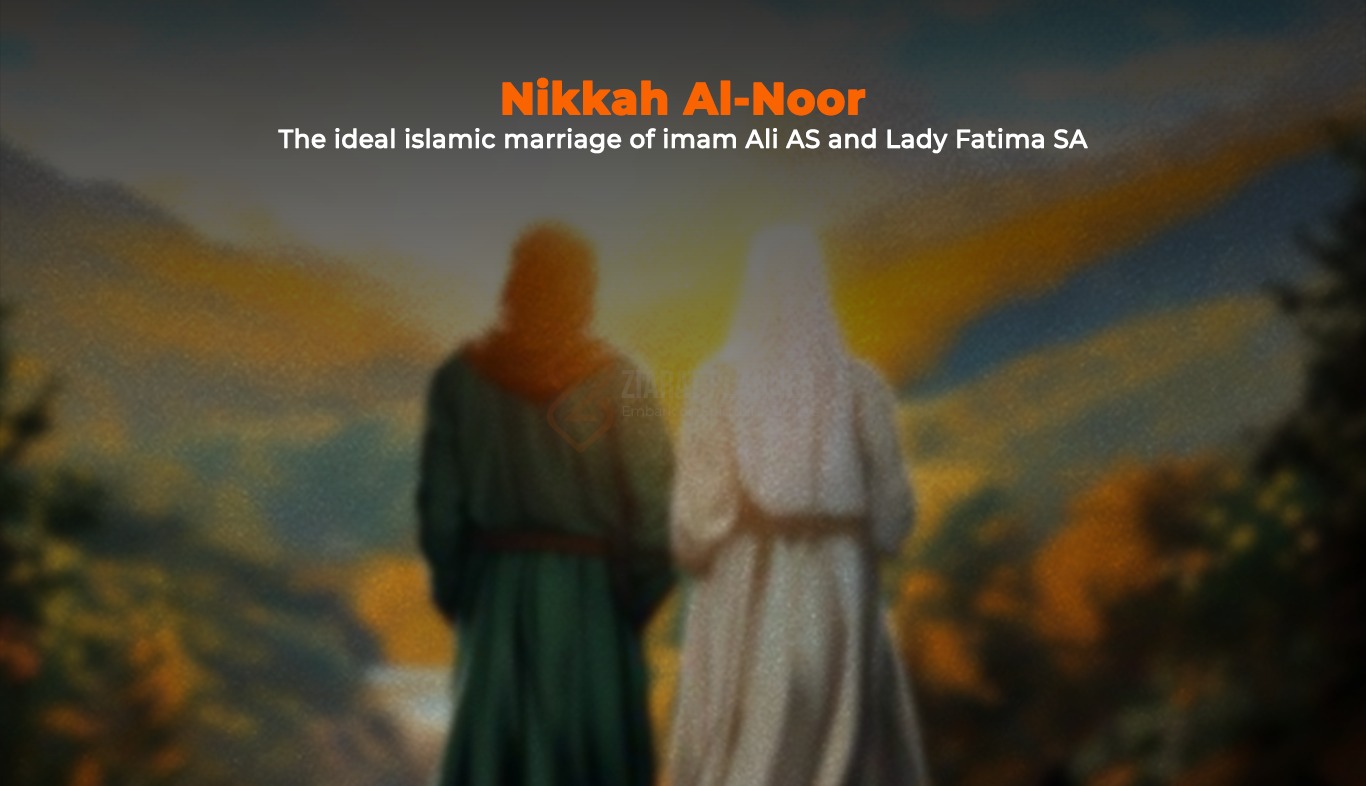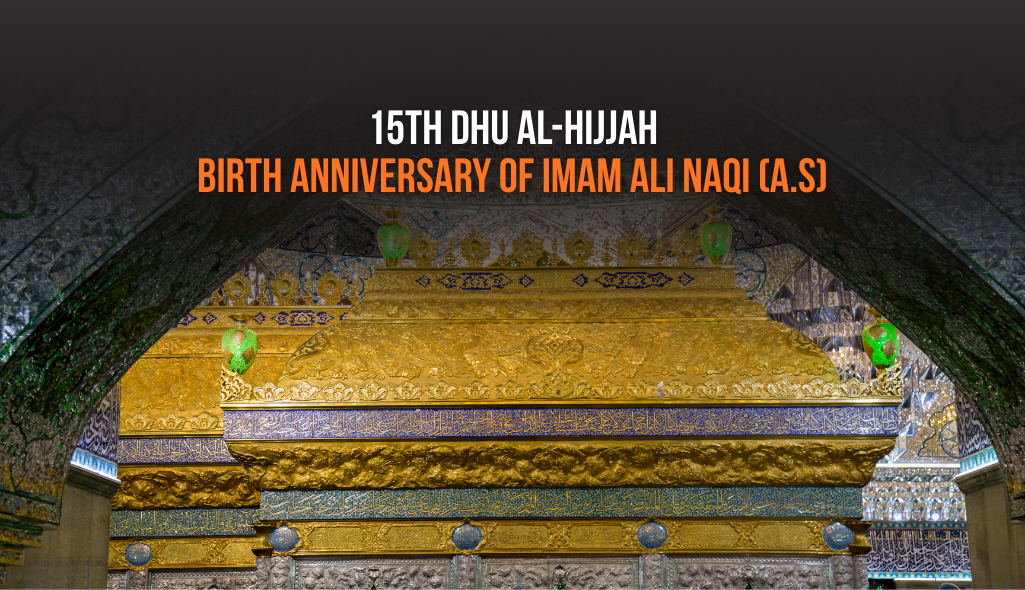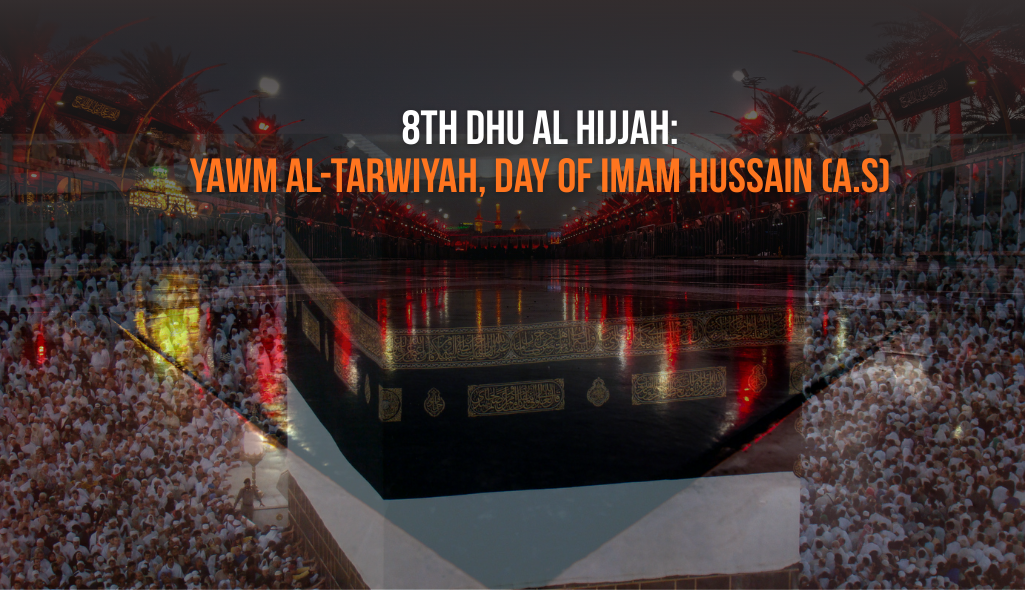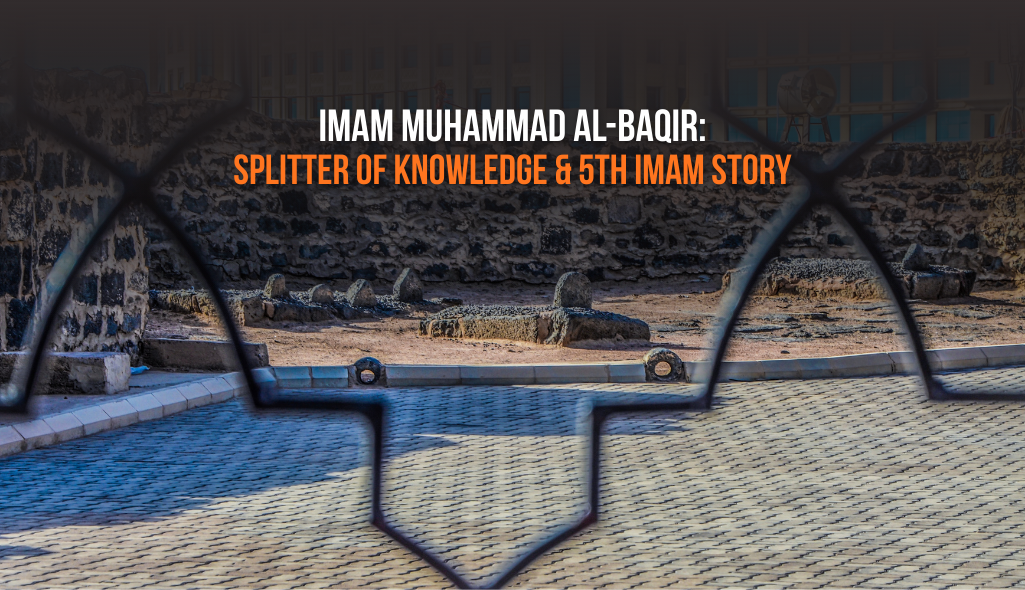Nikkah Al-Noor: The ideal islamic marriage of IMAM ALI AS and Lady Fatima SA

Introductory Words
In Islam, Nikah (marriage) is not merely a social contract but a sacred act of worship a spiritual bond built on love, mercy, and harmony. The Holy Qur’an describes spouses as Libas garments for one another offering protection, beauty, and comfort.
Among the most profound examples of an ideal Islamic marriage is the union of Imam Ali (AS) and Lady Fatima Zahra (SA). Known as “Nikkah Al-Noor” “The Marriage of Light” this divine union was blessed both on Earth by the Holy Prophet Muhammad (PBUH) and in the heavens by the angels. It stands as a timeless model of purity, faith, and divine satisfaction.
This marriage was not adorned with worldly pomp or extravagant dowries, but was rooted in piety, simplicity, and the pleasure of Allah. It marked the joining of two of the purest souls, whose legacy continues through the noble lineage of the Ahlul-Bayt (AS).
As we explore the details of this heavenly marriage, we uncover essential lessons for modern Muslim couples prioritizing spiritual compatibility, mutual respect, and simplicity over material concerns. Let us reflect on this luminous union and draw inspiration to build our own relationships in the light of faith, values, and divine love.
What is Nikah in Islam?
A Sacred Bond Beyond a Contract In Islam, Nikah (marriage) is more than just a legal contract — it is a divine and spiritual covenant between a man and a woman. It lays the foundation for a life built on mutual love, tranquility, and faith. It’s a means to attain nearness to Allah, emotional fulfillment, and the continuation of human lineage within the framework of halal (permissible) love.
Qur’anic Verses About Marriage (Nikah): The Divine Command to Unite.
1.Marriage as a Sign of Allah And among His signs is that He created for you spouses from among yourselves so that you may find tranquility in them; and He placed between you affection and mercy.
(Surah Ar-Roam , Verse21) This verse highlights that marriage is one of the miraculous signs of Allah a source of peace, mercy, and divine love.
2.Encouragement to Facilitate Marriage. And marry those among you who are single, and the righteous among your male and female servants. (Surah An-Nur ,Verse 32)
This verse encourages the community to support and facilitate marriage for singles, promoting purity, stability, and social harmony.
Prophet Muhammad’s (PBUH) Teachings on Marriage.
1. Nikah is My Sunnah” A Prophetic Tradition The Holy Prophet (PBUH) said:
Nikah is my Sunnah. Whoever turns away from my Sunnah is not from me
(Wasa’il al-Shi’ah, vol. 20)
This Hadith emphasizes that marriage is a Prophetic tradition, and distancing oneself from it is distancingm from the path of Islam.
2. The Most Beloved Structure in Islam.
The Prophet (PBUH) also said:
No foundation has been built in Islam more beloved to Allah than marriage.
(Wasa’il al-Shi’ah, vol. 20)
This Hadith highlights that marriage is the most cherished social institution in the eyes of Allah.
Teachings of the Imams (Ahlul-Bayt) on the Blessings of Marriage.
1. Imam Ja’far al-Sadiq (AS) on Married Life vs. Single Life “Two rak’ahs (units of prayer) offered by a married person are better than seventy rak’ahs offered by a single person.” (Wasa’il al Shi’ah,vol. 20, Chapter: Encouragement of Marriage). This Hadith shows how spiritually rewarding married life is in the sight of Allah.
2. Imam Ali al-Ridha (AS): “Half of Religion is Secured” When a person gets married, he has protected half of his religion. (‘Uyun Akhbar al-Ridha, vol. 2) This Hadith highlights that marriage safeguards one’s faith and moral integrity.
The Marital Proposal of Lady Fatima (sa): A Divine Selection and Prophetic Wisdom Lady Fatima al-Zahra (sa), the daughter of the Prophet Muhammad (PBUH), was not just a noblewoman of high virtue but a symbol of purity, intellect, and devotion. Her marital selection was not left to cultural norms or societal status it was a matter of divine will and prophetic insight.
Marriage Proposals for Fatima (sa)
As Fatima (sa) reached the age of maturity, many prominent companions of the Prophet (PBUH)including Abu Bakr and Umar approached him seeking her hand in marriage. These men held worldly respect and
influence, but the Prophet (PBUH) gently declined all proposals.
The Prophet’s Response. Every time a proposal came, the Messenger of Allah (PBUH) responded with the profound words: “Amruha ilallah” “Her matter rests with Allah.” This reply was not mere formality; it signified that Lady Fatima’s marriage was to be determined by divine command, not by worldly measures.
Why Worldly Standards Were Not Enough. Fatima (sa) was a woman of unparalleled status chaste, wise, spiritually elevated, and raised in the Prophet’s household. Thus, her husband had to be someone who: Matched her in faith, piety, and intellect Possessed noble lineage and deep humility Could carry the mission of Islam forward with courage and truth Would be a companion in both this world and the hereafter Only one individual met all these conditions Imam Ali ibn Abi Talib (as).
The Divine Message: Gabriel Brings Allah’s Command At the appointed time, Imam Ali (as), though hesitant out of humility, approached the Prophet (PBUH) with a proposal. Before any decision was made, *Angel Jibreel (Gabriel) descended with a message from Allah: O Muhammad, Allah has already performed the marriage of Ali to Fatima in the heavens. (Bihar al-Anwar, vol. 43)
The Prophet (PBUH) joyfully accepted and sought Fatima’s (sa) consent. Upon her silent approval, the most blessed and divinely-ordained marriage in Islamic history was announced.
Imam Ali’s Marriage Proposal: A Message of Faith and Trust
The blessed story of Imam Ali’s marriage proposal beautifully reflects his humility, faith, and devotion. As the cousin of Prophet Muhammad (PBUH) and a close member of the Prophet’s household, Imam Ali (AS) did not possess wealth or material resources at the time.
Modesty and Humility.
When Imam Ali (AS) presented his proposal to the Prophet (PBUH), his natural modesty made him hesitant to speak openly about his financial limitations. Despite his lack of worldly wealth, the Prophet (PBUH) recognized his sincerity and character, emphasizing that this marriage was about seeking Allah’s pleasure, not worldly status.
Expression of Trust and Conviction.
Imam Ali (AS) expressed that although he was poor, he prioritized the pleasure and approval of the Prophet (PBUH) above all. This act of faith and trust shows that true happiness and success come not from wealth but from earning Allah’s satisfaction and the Prophet’s blessings.
Prophet’s Consultation and Lady Fatima’s Consent.
The Prophet (PBUH) also consulted Lady Fatima (SA) about the proposal. She accepted it wholeheartedly, considering her father’s approval as her own happiness. This highlights the essential Islamic principle that mutual consent of both spouses and the blessing of the parents form the foundation of a blessed marriage.
The Marriage Sermon and Dowry A Blend of Simplicity, Blessings, and Spirituality
The marriage ceremony of Imam Ali (AS) and Lady Fatima Zahra (SA) was not just a historical event it became an everlasting model of guidance, simplicity, and sincerity for every believer until the end of time.
The Holy Prophet (PBUH) Officiates the Marriage This sacred union was personally solemnized by the Prophet Muhammad (PBUH). Once Imam Ali’s proposal was accepted, the Prophet gathered the companions in Masjid al-Nabawi and delivered the Nikah (marriage) sermon.
He began with the praise of Allah: Alhamdulillah al-mahmood bi ni’matihi, al-ma’bood bi qudratihi, al-muta’a bi sultanihi, al-marhoob min ‘azabihi… (Bihar al-Anwar, Vol. 43)
In this khutbah, the Prophet highlighted monotheism, the importance of piety, rights within marriage, and the
blessed nature of the union. These timeless words are still recited in Muslim wedding ceremonies today.
The Haq Mehr Grandeur in Simplicity Imam Ali (AS) set the dowry for Lady Fatima (SA) at 500 silver dirhams the amount he received from selling his shield. The Prophet (PBUH) accepted this mahr and divided it for essential wedding items, perfume, and simple home arrangements.
This dowry was not a display of wealth, but rather the foundation of a blessed, humble, and purposeful life. The Spiritual and Cosmic Significance of This Sacred Union The Merging of Two Oceans of Light The marriage of Imam Ali (AS) and Lady Fatima Zahra (SA) was not merely the union of two noble individuals it was a divinely orchestrated, celestial, and luminous bond, witnessed and celebrated by the heavens and the earth alike.
A Marriage Sealed in the Heavens According to authentic narrations, while the marriage ceremony took place on earth, the actual Nikah had already occurred in the heavens. The Holy Prophet (PBUH) declared: This marriage was conducted on earth, but it had already been decreed in the heavens. (Bihar al-Anwar, Vol. 43) Angel Jibra’il (Gabriel) brought the glad tidings that Allah Himself had approved and ordained the marriage of Fatima (SA) to Ali (AS). The heavens rejoiced, and the Throne of Allah (Arsh) took pride in this sacred event.
The Beginning of the Blessed Lineage Ahlul-Bayt (AS) From this divine marriage began the pure lineage of Ahlul-Bayt (AS), often referred to as the “Lineage of Light.” This sacred union gave rise to Imam Hasan (AS) and Imam Husayn (AS) the continuation of divine leadership (Imamat).
The Holy Qur’an affirms the purity of this family in the verse of purification ndeed, Allah intends to remove all impurity from you, O People of the House, and purify you with a thorough purification. (Surah Al-Ahzab, 33:33) And Allah made their love obligatory for the Ummah:
Say: I do not ask of you any reward for it except love for my near relatives.
(Surah Ash-Shura, 42:23)
True Compatibility (Kufa’ah) – Rooted in Faith and Piety This marriage is the ultimate demonstration that true compatibility is not based on wealth, lineage, or status, but on faith, character, and spiritual excellence. Regarding this match, the Prophet (PBUH) declared: If Ali had not been created, there would have been no equal for Fatima. (Bihar al-Anwar) Imam Ali (AS) was the only true and worthy companion for Lady Fatima (SA) spiritually and divinely. Universal and Eternal Impact
This marriage: Marked the continuation of divine leadership and guidance Strengthened the spiritual foundations of Islam Presented a heavenly model of family life Offered both men and women a perfect example of virtue and unity. This sacred union was not just a marriage—it was the meeting of two oceans of divine light, the manifestation of Allah’s will, and a beacon of guidance for all of humanity.
What Modern Marriages Can Learn from the Nikah of Ali (AS) and Fatima (SA)
The blessed marriage of Imam Ali (AS) and Lady Fatima Zahra (SA) offers profound guidance for every generation. In a world where marriage is often complicated by materialism and unrealistic expectations, their sacred union presents a divine blueprint for simplicity, sincerity, and spiritual harmony.
1. Simplicity Over Extravagance Their marriage ceremony was modest yet dignified. No lavish dowry, no extravagant wedding feast just sincerity and barakah (blessings). This teaches us: True success in marriage lies in mutual respect and sincerity, not in grand celebrations. Simple marriages are often more spiritually grounded and emotionally fulfilling.
2. The Role of Parents – Guidance with Trust The Holy Prophet (PBUH) played an active but respectful role. He consulted his daughter Fatima (SA) before finalizing the proposal and waited for her contentment.
Parents today must ensure open communication with their children, especially daughters. Emotional support and respecting their voice strengthens trust and love.
3. The Importance of the Girl’s Consent When the Prophet (PBUH) asked Lady Fatima (SA) about the proposal, her silence was taken as consent a powerful gesture in Arab culture of that time. In Islam, a woman’s consent is not just recommended it is mandatory. Her choice reflects her dignity, intellect, and agency.
4. Choosing Piety Over Status Lady Fatima (SA) received proposals from prominent companions. Yet Allah chose Imam Ali (AS) not for his wealth, but for his faith, courage, and purity. Taqwa (piety) should be the core criteria for selecting a spouse, not wealth or looks. A spiritually aligned couple creates a stronger, more purposeful bond.
5. A Dowry with Meaning, Not Burden
The dowry (mahr) was minimal 500 silver dirhams, earned by selling Imam Ali’s shield. Yet its value was spiritual and symbolic. Dowry must not be a burden or business deal. It should be a token of honor and responsibility, not an obstacle.
6. Building a Home, Not Just a House Their marriage was the foundation of a household built on worship, humility, love, and service to others. It became the source of divine leadership for generations. Couples today must aim to build homes that nurture values, not just meet material goals.
Conclusion illuminating our Marriages with the Light of “Nikkah Al- Noor
The blessed union of Imam Ali (AS) and Lady Fatima Zahra (SA) was not just a historical event it was a heavenly message for all of humanity: that marriage, when grounded in faith, simplicity, mutual respect, and
divine intention, becomes a source of light for generations to come. In an age where materialism and social pressures often cloud the essence of relationships, this sacred Nikah reminds us to return to the roots of Islamic values, where the bond between two souls is formed not just for companionship, but for spiritual elevation and divine closeness.
We pray: O Allah, illuminate our marriages with the light of Ali and Fatima. Grant us the wisdom to build
homes rooted in taqwa, love, and sincerity. Help the youth of our Ummah find righteous life partners, just as
You divinely chose Ali for Fatima. Make our homes echoes of the house of Ahlul-Bayt (AS), filled with mercy, trust, patience, and unwavering faith. May we strive to follow their footsteps—not with extravagance, but with modesty; not with material status, but with noble character; and not with worldly show, but with spiritual purpose. For in the end, a marriage blessed by Allah is not defined by how grand the ceremony is, but by how beautiful the journey becomes.





